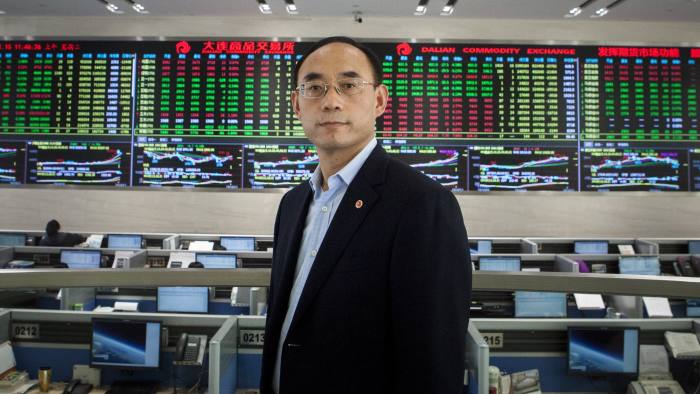As China prepares to introduce its first options contracts for commodities trading, the head of one of the country’s leading bourses for raw materials has shrugged off fears that the move will add to the extreme volatility in commodities seen in 2016.
在中国准备推出首批大宗商品期权合约之际,人们担忧此举将加剧2016年所见的那种极端波动,不过中国一家原材料交易所的负责人对这种担忧表示不以为然。
“We [in China] are behind international markets because we have too few tools, too few products,” says Li Zhengqiang, chairman of the Dalian Commodity Exchange, adding that introducing more products and new instruments like options will help hedge risk, not add to it.
大连商品交易所(Dalian Commodity Exchange)理事长李正强表示:“我们和国际市场还有很大的差距……我们目前工具不够,产品也不够。”他补充称,推出更多产品,引进像期权这样的新工具,有助于对冲风险,而非加剧风险。
Regulators approved the launch of the country’s first commodities options last month, giving the nod to Dalian to launch soyameal contracts later this year, and for white sugar options at rival Zhengzhou Commodity Exchange.
监管机构上月批准了中国首批大宗商品期权合约,同意大连商品交易所于今年晚些时候开展豆粕期权交易,同意郑州商品交易所(Zhengzhou Commodity Exchange)开展白糖期权交易。
The approvals come after a year of record volumes in Chinese commodities futures trading. Explosive gains in Chinese steel and coal contracts in 2016 took international markets by surprise and lifted prices globally. The boom in futures trading alarmed regulators, who feared a repeat of the stock market turmoil experienced the year before.
在监管机构批准期权交易前,中国大宗商品期货一年来的交易额创出历史最高纪录。中国钢材和煤炭合约交易额在2016年的爆炸性增长让国际市场感到意外,并提升了全球价格。期货交易激增让监管机构感到不安,他们担心重演2015年股市动荡那一幕。

In 2016, the Dalian exchange saw trading volumes jump almost 50 per cent from a year earlier to Rmb61.4tn, a three-fold increase from 2010. Trading volumes on China’s three exchanges reached a combined record of Rmb177tn last year.
在2016年,大商所交易额比上年飙升近50%,至61.4万亿元人民币,较2010年增长2倍。中国三大交易所去年的交易总额达到创纪录的177万亿元人民币。
Mr Li, who wants the DCE to become one of the international centres for commodities pricing and risk management, says there is a growing consensus among Chinese officials of the need to embrace new financial products. China launched options on an equity index in 2015.
李正强希望让大商所成为大宗商品定价和风险管理的国际中心之一,他表示,中国官员中间日益形成了有必要支持金融新产品的共识。中国在2015年推出了股指期权。
In an interview in the northeastern port of Dalian, he said: “Society used to worry about new products, and officials did as well. Now they basically don’t have doubts any more.”
他在大连接受采访时表示:“特别是以前,社会上对期货有顾虑,有些部委对上市期货品种都很担心,现在这个疑虑基本没有了。”
Introducing options is first of the exchange’s “three big strategic missions,” he says, along with allowing foreign investors to trade directly in Chinese futures, and introducing swaps contracts.
他说,推出期权交易是大商所“三大战略任务”的第一步,另两个任务是允许境外投资者直接交易中国期货以及推出掉期合约。
Options — which give the right but not the obligation to buy a financial contract in the future — would allow greater hedging flexibility for Chinese corporations; swaps would allow producers and consumers greater protection against commodity price volatility.
期权给予投资者在未来购买金融合约的权利,但并非义务。期权将让中国企业拥有更大的对冲灵活性;掉期合约将让生产商和消费者能够更好地防范大宗商品价格的波动。
Both products have boosted volumes and profits for exchanges worldwide, but China’s conservative regulators had worried they would introduce even more volatility into domestic markets already known for their wild price movements.
两种产品都提升了世界各地交易所的交易规模和利润,但中国保守的监管机构担心它们将会加剧国内市场的波动性——中国市场本已因价格剧烈波动而闻名于世。
“We are behind international markets because we have too few tools, too few products. And another disadvantage: at the moment, we are still a relatively closed market,” he says.
他说:“我们和国际市场还有一个很大的差距就是,我们还是一个相对封闭的市场。我们毕竟还不是一个开放的市场……但目前工具不够,产品也不够。”
Foreigners can set up a China-registered company to trade Chinese futures, but the process is cumbersome. Mr Li wants overseas investors to directly trade Dalian’s iron ore contract and possibly its palm oil contract. Regulators have yet to sign off.
外国人可以在中国注册公司交易中国期货,但过程繁琐。李正强希望海外投资者可以直接交易大商所的铁矿石合约,可能还有棕榈油合约。监管机构迄今仍未放行这些交易。
While China is the leading buyer of most resources, including soyabeans, iron ore and oil, its futures markets are at a nascent stage, and Beijing is still feeling its way out of the state planning era. Only three years ago, it declared in policy reforms that markets should play a “decisive” role in allocating resources.
尽管中国是包括大豆、铁矿石和石油在内的大多数资源的主要买家,但其期货市场仍处于初期阶段,而且北京方面仍在摸索着走出政府计划时代。就在3年前,中国宣布了应该让市场在资源配置中发挥“决定性”作用的政策改革措施。
Mr Li is pulling for China’s transformation into an international financial centre equal to its economic heft. International traders already pay attention to China’s commodities exchanges — Dalian and the country’s two other commodities exchanges in Shanghai and Zhengzhou — which for several years have set the direction of international markets for metals and grains.
李正强希望中国转变为与自身经济实力相匹配的国际金融中心。国际交易员已经开始关注中国的大宗商品交易所——分别位于大连、上海和郑州——它们近些年来确定了国际金属和谷物市场的方向。
But he understands the need for caution. “For China to launch any new tool, any reform, it needs a suitable environment. And what does that mean? It needs the market to be relatively stable.”
但他明白有必要保持谨慎。“任何市场创新都需要一个有利的外部环境。比如市场要比较平稳。如果市场不稳定,那就很难具备上市新品种的条件。”
Mr Li believes China’s three exchanges will someday rival the LME or CME as global players. But for now, they must balance their mission to increase trading volumes with averting a socially destabilising crash, he says. “Our responsibility is to keep the market stable. The burden on us to dampen market risk is greater.”
李正强相信中国的三家商品交易所总有一天能与伦敦金属交易所(LME)或芝加哥商品交易所(CME)媲美,成为全球性的交易所,但就目前而言,它们必须谨慎行事,既要实现增加交易额的计划,又要避免出现不利于社会稳定的暴涨暴跌,不能顾此失彼。“中国的期货交易所在维护市场稳定,防范市场风险方面,比世界其他成熟交易所的责任要重一些。”
Additional reporting by Archie Zhang
张祺补充报道













